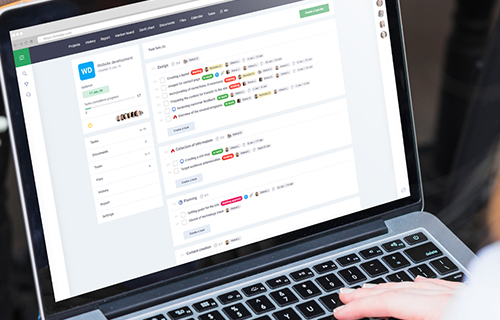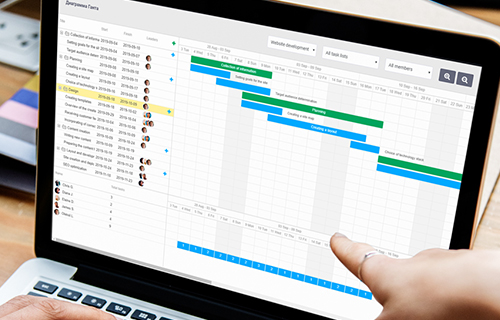What is time management - 10 Secrets
The main resource for each work type, especially for project management, is time. Its important feature is non-regenerability: you can get additional investments, needed information, employees etc. But it’s impossible to bring back the time you wasted, to redeem it without losing quality of the final product. With the help of time-management you can learn how to carefully and efficiently treat the available resources. This isn’t an academic discipline or a professional skill - it’s an art of managing time, a practical skill that will accompany you in all spheres of life once you learn it. And the most important thing is that every person can learn to be in charge of their own time efficiently - and we’ll help you understand how to do it and how to begin using such a useful skill both in your everyday and professional life!
What is time management?
The definition for ‘Time management’ doesn’t mean any supernatural skills, the ‘management’ part is intended to mean a skill of how to be in charge of all available time resources, to keep records and to plan them in the most efficient and correct way. In science terms time-management means a certain approach to managing your own time and improving the effectiveness of its use.
Let’s try to understand what time management means in simple terms. First of all, this is a possibility to work less and manage more. So this is a skill to resolve all the necessary issues and to complete the needed tasks within the minimum timeslot. For this you need to learn to distribute the time frames you have in such a way so that you could complete all high-priority tasks in time and not get distracted for minor and secondary aspects.
Herewith you won’t be asked to live as if you constantly had deadlines, and to be torn at work between its different stages. In other words, time management will let you do more not due to increasing intensity of your activity, but due to optimizing time expenses for each type of the activity as well as to eliminating misuse of your time. Because if you monitor the nature of your activity during the day, you’ll see that a person does a whole lot of unnecessary things, and this does not apply to having rest, eating and other essential activities. Moreover, if you manage your time properly, you will get even more space in life and more opportunities to be engaged with your favorite doings.
The history of formation of time management
People began thinking about the necessity of normalizing their daily routine and arranging their activity at the beginning of the new era. The first works, devoted to the issues of dividing time into good, bad and wasted, were written by ancient philosopher Seneca. He told that each used period of time had to be evaluated based on its occupancy. These ideas of the ancient Roman scientist became eventually a basis for learning of personal effectiveness.
A big contribution to the development of time-management science was made by Italian scientist Alberti. He was the first to tell about the connection between effectiveness of use of time and personal success. Also, Alberti defined 2 rules that can relate to the principles of time management:
- Make a plan for the whole day and include all things you have to do.
- Put all tasks in descending order of priority.
People began to take advantage of these recommendations only in the 1980s. And specialists of all levels, such as CEOs, managers and other experts, saw the true value of time management skills. Also, they are required for business owners, authors and performers in projects. Moreover, these skills will be handy for almost every busy person in any sphere of life.
Main rules of time management
If you wonder where to start with learning time-management, then most probably our answer will surprise you. First of all, you’ll need to understand whether you have to be able to manage time resources. The thing is that this skill will be useless for a person who has only a few tasks.
In case you do feel time pressure and always have not enough time to do things, then you have to get familiar with the following principles:
- Plan activities for a particular time frame. This will help not miss any task and prioritize them. Besides, divide all tasks into flexible and non-flexible. The first ones don’t have any strict time reference, however they still have a deadline and a certain level of importance. For example, to make a report until Tuesday is a flexible task. Briefings, business meetings, forums etc. are examples of non-flexible tasks that refer to particular dates and times.
- Make a to-do list in a written form. Either manually written or in a document on a computer, such a list will be much more effective and visual than the one you keep in your mind.
- Separate tasks into big and small. This will help you distribute the time you have more clearly.
- Use online management systems - Intasker service will help you not only remember about all tasks, but also control their progress, get reminders and engage extra performers to work.
- Consider possible circumstances and events that are beyond control. Thus always have a certain time slack to deal with their consequences.
- Specify clear goals and tasks that will lead you to getting a required result. Goal-setting is one of the main conditions of effective time management. Goals have to be both general and local.
- Monitor that the plan of actions and timeframes are followed. Gantt charts may be used for this. In the Intasker system you can build with one mouse click a visual chart illustrating volume and hierarchy of tasks, as well as time left for their completion. The system will take all the necessary data from the previously made task list.
- Separate the available tasks in accordance with their importance and complexity. First of all, the hardest and most important tasks have to be completed. This will not only improve work productivity, but also drop the level of stress - you won’t need to constantly think about a hard task that you have for the last.
- Locate and eliminate ‘time stealers’. These are doings that are useless for the final goal and that take much time. The main time stealers are social networks, emails, TV, smartphone with many apps, smoke breaks, too frequent tea breaks, etc. Conversations with colleagues and people you know can also be referred as time stealers.
- Plan your rest. This will not only help distribute the available time resources more efficiently, but also will secure you from exhaustion.
These are the main principles of time management. However it’s not limited to them. You can develop your own principles according to the particularities of your activity.
Advantages of applying time management
Let’s clarify one more time, what for time management is needed. Integrating its rules and principles into your activity will ensure the following benefits:
- a possibility to achieve more goals and tasks;
- increase of success rate of your activity;
- achieving planned tasks within shorter time frames;
- having time for hobby, sports, communication with your loved ones and friends;
- feeling no exhaustion and no stress;
- a possibility to precisely plan time for a particular period;
- getting control over your own life.
Thus, acquiring time management skills will help you achieve both - more effectiveness in your professional field and more free time.






